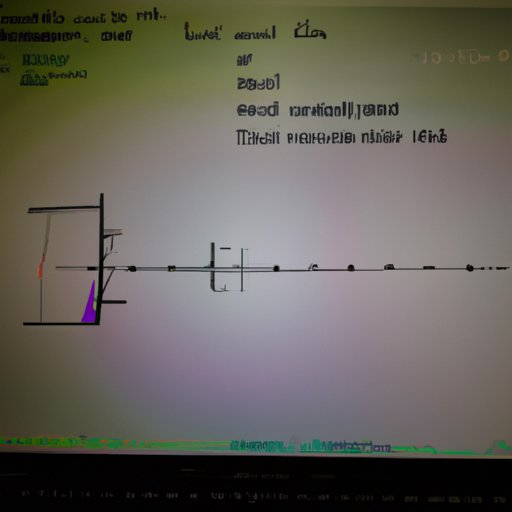Introduction
Calculus is a branch of mathematics that deals with derivatives, integrals, and limits. It is a powerful tool that is used in many areas of science, engineering, and technology. In particular, it has an important role to play in computer science. This article will explore the role of calculus in computer science and its importance for problem solving, efficiency, accuracy, artificial intelligence, and machine learning.
Exploring the Role of Calculus in Computer Science
Before we can delve into the role of calculus in computer science, it is important to understand what calculus is. Calculus is a form of mathematics that studies changes in functions over time. It focuses on the rate of change of a function, as well as the area under a curve. It is used to solve problems related to motion, forces, and other physical phenomena.
Calculus is closely related to computer science. Computer scientists use calculus to model changes in data over time. They employ calculus to analyze algorithms and optimize their performance. Calculus is also used to develop mathematical models of complex systems such as neural networks and robotic systems. In addition, calculus is used to design algorithms that can be used to solve difficult problems.
There are several examples of calculus being used in computer science. One example is the use of calculus to optimize the performance of search engines. Search engine algorithms are designed to find the most relevant results for a given query. Calculus is used to determine the best way to organize and rank the results so that they are presented in the most effective manner. Another example is the use of calculus to develop algorithms for machine learning and artificial intelligence. These algorithms use calculus to identify patterns in data and make predictions about future events.
Understanding the Impact of Calculus on Computer Science
Calculus has several benefits when it comes to computer science. First, it allows for increased efficiency. By understanding how a system works and how it responds to changes, computer scientists can optimize the performance of algorithms. This increases the speed at which a task can be completed, resulting in increased efficiency.
Second, calculus improves accuracy. Algorithms that use calculus can detect subtle changes in data over time. This helps to ensure that the results of a computation are accurate and reliable. Finally, calculus enhances problem solving skills. By understanding the principles of calculus, computer scientists can develop more efficient solutions to complex problems.

Examining the Benefits of Using Calculus in Computing
Using calculus in computing offers several advantages. One benefit is increased efficiency. By understanding the rate of change of a function, computer scientists can optimize algorithms to complete tasks faster. This results in improved performance and reduced time to completion.
Second, calculus can improve accuracy. By analyzing the rate of change of a function, computer scientists can detect subtle changes in data. This leads to more reliable results and improved accuracy. Finally, calculus enhances problem solving skills. By understanding the principles of calculus, computer scientists can develop better solutions to difficult problems.

Investigating the Applications of Calculus in Computer Science
Calculus has several applications in computer science. One application is artificial intelligence and machine learning. Artificial intelligence and machine learning algorithms use calculus to identify patterns in data and make predictions about future events. Calculus is also used in robotics. Robotic systems use calculus to calculate the trajectories of objects and to control the movement of robots.
Finally, calculus is used in data science. Data scientists use calculus to analyze large datasets and uncover hidden insights. This helps them to make informed decisions based on the data.

Analysing the Importance of Calculus to Computer Science
Calculus is an essential part of computer science. Advanced mathematics such as calculus is needed to develop algorithms and solve complex problems. Without calculus, computer scientists would not be able to develop sophisticated algorithms or create models of complex systems.
In addition, calculus is a foundation for computer science. It provides the tools necessary to analyze algorithms and optimize their performance. It is also used to develop mathematical models of complex systems and to design algorithms for artificial intelligence and machine learning.
Conclusion
This article has explored the role of calculus in computer science and its importance for problem solving, efficiency, accuracy, artificial intelligence, and machine learning. It has examined the benefits of using calculus in computing, as well as the applications of calculus in computer science. Finally, it has highlighted the importance of calculus to computer science and how it serves as a foundation for advanced mathematics.
In conclusion, calculus is an invaluable tool for computer science. It provides the tools necessary to analyze algorithms and optimize their performance. It is also used to develop mathematical models of complex systems and to design algorithms for artificial intelligence and machine learning. Calculus plays a critical role in the development of computer science and is essential for the advancement of the field.
(Note: Is this article not meeting your expectations? Do you have knowledge or insights to share? Unlock new opportunities and expand your reach by joining our authors team. Click Registration to join us and share your expertise with our readers.)
